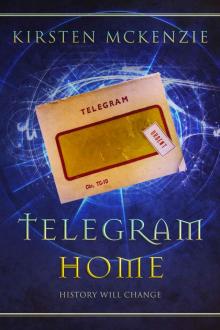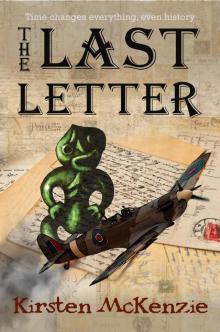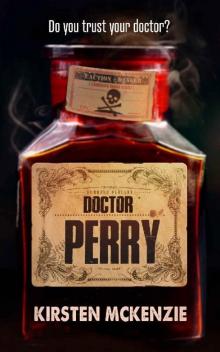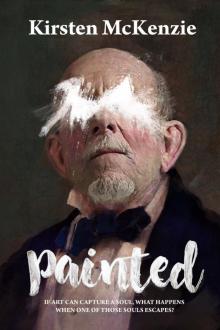- Home
- Kirsten McKenzie
Doctor Perry Page 9
Doctor Perry Read online
Page 9
Doctor Perry calculated the next dosage for Mary Louise based on her reaction to the amount he’d administered last week. Her high level of fitness made her more susceptible to the effects of the tonic and the doctor didn’t want to admit that he’d made a dosage error but he’d spent so long now working with the elderly and infirm, that he’d miscalculated last week’s dosage. Her recovery should have been much more incremental, that way he’d avoid questions from the hospital who were paying him for this service, and earn her trust. Avoiding questions from other medical specialists was key to his ongoing success.
The scarring still marred her abdomen. He’d been unable to produce any form of tonic to solve that problem. Not that his clients cared too much, they were happy with what they got. Clients who had exhausted all official channels. Some used their funds to trek across the world to acquire the rarest of trophies. Clients for whom even the costliest of medical treatments had failed. Clients who paid whatever they needed to, to get what they wanted with no questions asked. Those were his clients.
Doctor Perry’s name was traded through whispered back channels and quiet internet chat rooms. Not that his name had always been Doctor Perry. He’d had many names and Doctor Perry was his latest incarnation, and the one he was about to retire.
A baby with abdominal scars was almost as desirable as a child with no scars. He provided every child with a thorough medical history explaining away the scars and any injuries he couldn’t reverse. He wasn’t a god, but he played the part well. Despite the scarring, re-homing Mary Louise was going to be easy, he even had a couple in mind — their religion dictating no medical interference in the pursuit of fertility, but buying a baby, that was fine. Doctor Perry knew there’d ask no difficult questions about the scars on her stomach or the old breaks of her limbs, because God would save her if she ever got ill, which he knew she wouldn’t, based on the medical history provided by the hospital. He’d stumbled onto the most perfect of careers — a matchmaker of sorts, one which could assure any new parents that their child would never contract cancer or develop MS. He smiled as he listened to the healthy sounds in Mary Louise’s chest. She was perfect. Just the way he liked them.
“You are recovering well, but I stand by my initial assessment you can’t overdo things or you’ll go downhill and be back to where you started. One more week, Miss Jackson, and we can reconsider your status. You must trust me, I am your doctor.”
Doctor Perry measured out a dose of his tonic. Not as much as last time, he didn’t want her recovered by next week. He needed her well enough to come to his surgery and from there he’d administer the final dose. It wasn’t sensible to administer it to her at home, it might raise too many awkward questions if the neighbours saw him, or heard her.
He passed the medicine cup over to Mary Louise, who swallowed the liquid and then stared at the empty cup.
“What’s in your tonic Doctor Perry?”
He wasn’t fazed by the question. Most of his patients asked him, eventually.
“I spent time in the Amazon in my younger years,” he said, before explaining how he’d learnt the healing properties of the common rainforest plants the local tribes people had used for generations, which the pharmaceutical industry still tried to dispute, claiming the indigenous people were putting themselves and others at risk. The pharmaceutical industry would say that until they’d figured out a method of monetising the plants themselves.
Mary Louise lapped it up, nodding at every accented syllable. So docile, perfect.
“You can see how the pharmaceutical industry don’t want people knowing this because it would decimate their profits by putting a virtual end to the money-go-round of expensive treatments every physician prescribes, coerced by massive bribes from the industry. No, I’m happy helping my patients where I can. I try to stay under the radar, lest the big corporations catch a whiff of the results I get with my patients, with patients just like you.” He smiled and fancied he could see her growing younger in front of his eyes. The smoothing of fine lines, the erasure of sun damage, freckles fading away to nothing.
“I’m sure I’d be fine at work this week, if I took it easy.”
“No!” Doctor Perry shouted.
Mary Louise’s eyes widened, her youthful, line free eyes.
Doctor Perry smoothed out his own features and lowered his tone. “No, it’s the tonic masking the pain, you can’t overdo it. Next week come to the office for a final check. You’ll be fine going out by then but not before, you must promise me that. It’s for your own good. If you catch a virus from someone else, you’ll delay your recovery, and you don’t want that do you? You must trust me, Miss Jackson.”
Mary Louise nodded at him. Had his outburst had scared her into silence? If it meant she didn’t leave the house till next week, he’d be satisfied.
Doctor Perry wondered if using his tonic on younger people was too dangerous. Most had lives and jobs. The elderly were better — forgotten members of society, thrown on the scrap heap by their families. Considered a burden by society. He shook his head. Mary Louise was a bonus addition to his treatment programme, together with two other patients from the clinic he’d been cultivating, the twins at the house, and a handful of residents from the Rose Haven Retirement Resort. After that he’d be done and gone. He’d take his cash and move. With Myra? He’d think on that later. The thought of the furrow between Myra’s brows niggled at him. Time for a younger model? And Doctor Perry added his faithful wife to his ever lengthening list.
23
“What do you mean my food ain’t right? I’ve been here twelve years and they wouldn’t keep me on if my food ain’t any good.” Pauline blustered about the kitchen, trailing the faint scent of cigarette smoke behind her.
Benson leaned on the counter and waited out her tirade. Pauline had a heart of gold and she did her best with the things she had. He also knew her expletive laden response was bravado and she’d get over it, but he still hated having to pass on a complaint from a resident.
“Who does she think she is, waltzing in here and complaining about my food, eh? Miss High and Mighty, that’s who she is. Does she get waited on hand and foot at home, like? Something with curry in it? We’re not the Taj Mahal here. If I served up a dish of curry, you’d be dealing with a flow of shite bigger than the Tyne River, like. Curry.” Pauline shook her dyed blonde bob, shoving packets around in the pantry. “Ooh I’ll need a fag after this, eh?”
Benson cringed at the English slang. You could take the girl out of Northern England, but you couldn’t take the Northerner out of the girl.
“Sorry, Pauline. I know you’ll sort something out for her.”
“Oh, I’ll sort something out for her, you mark my words. Sort something out for her right where the sun don’t shine.”
Benson laughed. Once Pauline got back into slinging insults, all was well in her world.
“Been here one week and already complaining, eh? What’s she like with everything else then?”
“She’s okay. Seems quite taken with Elijah Cone. Livens up the dining room. I’m sure half the residents think she’s the paid entertainment.”
Pauline muttered a random Northern expression under her breath, the sort which defies translation into any other language.
“Can you do it Pauline? She’s missing her curry dinners, and she’s on her own. Can you rustle up something to make her happy?”
“Course I can. What do you take me for? She’ll get her curry, I’ll make sure, eh.”
“Thank you, Pauline.” Benson turned to leave Pauline’s gleaming domain. “Sorry, one last thing, keep this between you, me and Sulia Patel?”
“Oh, aye, course I can. Can’t have the boss getting a whiff of something not on the menu like. If I get caught…”
“You won’t. Thank you, Pauline. I owe you one.”
“Oh aye you do. I’ll remember. Now get outta me kitchen.”
Benson hurried down the hall, clipboard under his arm. He had two more resid
ents to check before his tea break and then… He pulled up outside the room which had until today had belonged to Johnny Paulson. Johnny’s few belongings were in a cardboard carton in the hall and inside the room, two big men, their butt cracks showing all their hairy glory, were trying to manhandle Paulson’s old arm chair through the door. Either the chair had grown, or the doorway had shrunk because the men were swearing like seamen as they shoved the chair fruitlessly into the door frame.
“What’s going on?” Benson asked.
“It’s not rocket science is it,” countered back one man.
“Nothing is going on, Benson. Paulson’s health has taken a turn for the worse and he has had to move to another facility, a secure facility. A sad time for all of us here at the Rose Haven Retirement Resort as I’m sure you’ll agree.” Tracey Chappell said, sailing into the hallway, her lipstick impossibly bright under the florescent lights.
“Tracey,” Benson greeted his boss. “It wasn’t on the charts.”
“An oversight I’m sure, but as you know sometimes these things come upon us.” She cast her powdered eyes over the removal men, who’d become a hundred times more efficient than they had been before her arrival. “There’s a new resident joining us tomorrow, so this room needs to be spic and span before then. I’m sure I can leave it in your capable hands, yes?”
“Yes, but Paulson’s things?”
“No need to concern yourself, Benson. It’s all taken care of. We’ll forward them to his new home, trust me.”
Benson nodded again. It wasn’t his place to question Tracey but he couldn’t help feel that there was something amiss with the whole situation. Not a single one of the other residents moved to secure facilities were transferred with such haste or without their paperwork forming a trail worthy of Hansel and Gretel. Among the staff, Tracey’s reputation was that she was at the Rose Haven for one reason and one reason only, to feather her personal financial nest as abundantly as possible.
Tracey barked at the removal men, who’d finally squeezed the chair through the doorway, sending them scurrying down the beige hallway, the chair held awkwardly between them.
“The room needs cleaning, Benson. See to it.”
The tap, tap, tap of her heels against the linoleum floors echoed in Benson’s ears, long after she’d disappeared, leaving him to survey the barren room. Crumpled sheets on the bed the only sign anyone had been there.
Benson stripped the linen, it was easier than waiting for someone else to do it as part of their shift later. As he gathered up the sheets, a page of notepaper fluttered to the floor, wedging itself under the industrial wheels of the trolley bed. Furtively, Benson looked around, unaware he was subconsciously worrying about someone watching him pick up the paper.
Benson rescued the standard sheet of notepaper smothered with ink, crumpled from being caught up in the bedsheets. There were dark, cramped words, filling every line. Some words underlined once, twice, three times even. One word written in capital letters, half a dozen times, jumped out at him - PERRY PERRY PERRY PERRY PERRY PERRY.
A cry in the corridor made Benson start, and he shoved the note deep into his pockets, guilt stealing over him. Benson checked past the doorway but there was no one in the hall, the crying was moving away from him. A distressed resident. They were all distressed in one way or another although he tried to make their lives better, to make them more comfortable, connected. But it was so hard with so few resources and without the support of management, who viewed every resident as a number, awaiting their turn, their death.
Paulson’s sheets under his arm, Benson hurried off to the laundry, the notepaper in his pocket burning through his trousers. He’d have to read it at home, he couldn’t risk reading it here, too many eyes. Surveillance was one thing management didn’t mind investing in. For the safety of the staff and residents, was their line. The staff knew it was so they could be picked up slacking off or stealing. There’d been a bit of that; a Lladro figurine, a brooch, a silver topped walking stick. Things easily bundled up in bedding, so the surveillance system didn’t achieve much there.
The crying restarted, reverberating around the hallway, bouncing off the industrial beige paint. Benson frowned, someone should have investigated by now. Rounding the corner, he stumbled across the issue.
“What you doing, Ginger?” Benson asked the woman cowering on the floor.
“They’re trying to take my boy.”
“No one is trying to take your boy, Ginger. It’s just us. Come now, I’ll get you back to your room. How d’you end up here?”
“They were going to take my boy, but I chased them off,” Ginger said.
Confused, Benson didn’t know how to answer her, instead he helped her to her feet and walked her down the labyrinthine corridors until they reached her room, a room full of sepia toned photographs and trinkets. Benson watched Ginger unfurl her arms and place the china statue she’d been holding in the centre of the shelf. Benson settled her into bed, covering her frail legs with a crocheted throw. He cast a long look back at the statue of the boy, Ginger’s boy, before closing the door behind him. If Ginger was wandering, becoming confused and forgetful, Tracey would have her moved out of the Rose Haven as quick as a flash. Ginger was a kind soul — a former pin up girl and a successful pageant competitor and model. Even before she’d moved into the Rose Haven, she was still a sometime catalogue model for retailers catering to the older shopper. A series of poor investments had frittered away her money and her confidence, leaving her withering away in a room a thousand times beneath her, surrounded by long forgotten moments of her life.
He should have made a note on his clipboard. He always made notes on his clipboard. He was renowned for making notes about everything to do with the health and welfare for the residents here. But today he wouldn’t be making any notes about Ginger Bruce, about her cowering in the corridor. If the cameras picked it up, he’d be questioned later, but until then he’d keep his own counsel and there wouldn’t be any notes. At that moment Benson decided that there’d be a lot fewer notes in his daily reports, if any.
24
“One boy had a blood nose today,” Myra told her husband, jiggling a young baby on her lap, a bottle thrust into his mouth.
Doctor Perry looked up from his dinner. “Which boy?”
“One of the twins. He’s okay, I cleaned it up but maybe you should examine him?”
“Yes, right after dinner. Thank you for telling me.” Perry flicked his eyes from his wife’s forehead back to his plate of spaghetti. He hated the stuff and spent more time moving it around the plate instead of shovelling it into his mouth. He watched his wife feeding the baby, her frown line spectacular now carving her face in half. Doctor Perry puzzled at the obvious degradation to her looks. Was the tonic losing its effectiveness? He tried to remember how long he’d been administering it to her. Other than himself, there was no one else on his books who’d been taking it as long. He’d have to write up these observations later tonight, he was meticulous with his note taking. You needed to be in his profession. Federal investigators didn’t worry him, he needed to record the successful and the unsuccessful dosages he administered. He’d try a stronger dose on Myra tomorrow because he didn’t think he could bear to look at her anymore.
“Aren’t you hungry?” Myra asked, her plate wiped clean with a piece of garlic bread, the crumbs adorning her chin, her hairy chin.
Doctor Perry’s stomach churned.
“I ate at the retirement home, they were celebrating someone’s birthday so there was plenty of food laid out.” The Doctor laid his fork on his plate, pushing it across the table, the scraping sound echoing in the kitchen. The baby slurped on, oblivious to the surrounding action.
Myra ducked her head towards the baby, ignoring him. This was becoming a trend. She made him feel unwelcome in his own home, the home he provided her. Her gave her everything she wanted. Why didn’t she know he didn’t like spaghetti? He suspected she did but served it to him, anyway. To s
pite him? Why did she do that? Why do things to annoy others? Wasn’t it easier to bend like grass in the wind, to make life easier, happier? He existed to make people happy, this was his role. He’d lost count of how many dreams he’d made come true. The childless couples he’d made whole and yet his wife couldn’t find it within herself to serve him a dish he liked. Why had it taken him so long to realise the level of spite she harboured for him when he’d done everything to keep her beautiful?
“I’ll check on the boy,” Doctor Perry muttered, averting his eyes from the woman he’d married, the woman turning into a grotesque version of the one he’d married, and who he’d kept, catering to her every need. And this was the thanks he got.
After her husband left the room, Myra cooed to the baby in her lap. This one was cute despite his funny shaped shoulder, giving him a slight hunchback which appealed to her. There was no beauty in symmetry, life’s beauty was in the odd and misshapen. Trees weren’t judged by the smoothness of their bark but by the canopy of their leaves or their proclivity to fruit. People judged trees by the stoutness of their branches and how easy they were to climb. There was nothing perfect in nature but nature itself was perfect.
Myra shuddered as she heard her husband’s heavy tread retreat down the uncarpeted hall followed by the opening and closing of the twin’s bedroom door. He didn’t slam it, that wasn’t his style, but the solid shutting of the door enough to tell her he wasn’t happy, inferring that she had contributed to the boy’s blood nose.
With the baby in the high chair she cleaned up the dinner dishes. She licked tomato sauce from her fingers as she tipped the leftovers into the trash, the spaghetti snaking around empty packets and discarded mushroom stalks. In her youth, she’d helped her mother collect wild mushrooms from the field behind their house. Mushrooms were tricky, eating the wrong one could kill you. Today’s fungi were harmless portobello mushrooms, yet she daydreamed that one poisonous variant slipped through the food safety check and that her husband had eaten it. She imagined him writhing in agony on the kitchen floor as she clutched her metaphoric pearls, and the smile widened on her thin lips, a smear of burnt tomato paste streaked across her chin, like war paint.

 Telegram Home
Telegram Home The Last Letter
The Last Letter Doctor Perry
Doctor Perry PAINTED
PAINTED